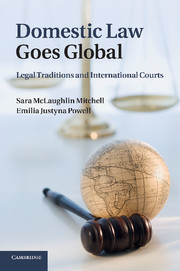Book contents
- Frontmatter
- Contents
- List of figures
- List of tables
- List of boxes
- Acknowledgments
- List of acronyms
- 1 The creation and expansion of international courts
- 2 Major legal traditions of the world
- 3 A rational legal design theory of international adjudication
- 4 Domestic legal traditions and the creation of the International Criminal Court
- 5 Domestic legal traditions and state support for the World Court
- 6 The rational design of state commitments to international courts
- 7 The consequences of support for international courts
- 8 Conclusion
- References
- Index
7 - The consequences of support for international courts
Published online by Cambridge University Press: 21 April 2011
- Frontmatter
- Contents
- List of figures
- List of tables
- List of boxes
- Acknowledgments
- List of acronyms
- 1 The creation and expansion of international courts
- 2 Major legal traditions of the world
- 3 A rational legal design theory of international adjudication
- 4 Domestic legal traditions and the creation of the International Criminal Court
- 5 Domestic legal traditions and state support for the World Court
- 6 The rational design of state commitments to international courts
- 7 The consequences of support for international courts
- 8 Conclusion
- References
- Index
Summary
In this book, we have shown that a rich relationship exists between domestic law and international courts. Originators of new international courts seek to design the courts in their own legal image, while joiners of pre-existing courts seek out adjudicating institutions that operate with familiar legal rules and principles. Domestic legal traditions influence states' willingness to support international courts and shape the design of states' commitments to courts as well. However, what difference do states' commitments to international courts make? Are international courts effective forums for conflict management? Do they alter states' domestic behavior, such as human rights practices?
Our theory suggests that international courts are not equally effective adjudicators for all states. Because the originators of new courts design them in their own legal image, this creates greater efficacy for member states with domestic legal traditions similar to the court's originating states. The World Court, for example, was designed according to civil law principles. As we demonstrated in the previous two chapters, this design feature resulted in greater support for the Court by states with civil legal traditions. This natural alliance of civil law states to the World Court should also enhance the Court's efficacy when managing conflicts between civil law states. In those instances, the adjudicator is better able to create focal points, provide information, and correlate the disputants' strategies.
- Type
- Chapter
- Information
- Domestic Law Goes GlobalLegal Traditions and International Courts, pp. 194 - 222Publisher: Cambridge University PressPrint publication year: 2011



